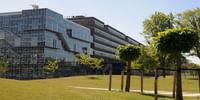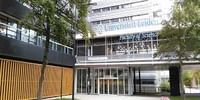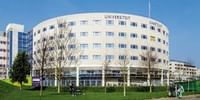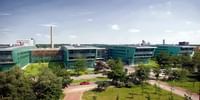- The Biomedical Sciences Master's program equips students with the knowledge, skills, and understanding required to operate as an independent professional in a range of disciplines and to be a suitable candidate for a subsequent career in biomedical research.
- The program offers students the opportunity to decide if their future lies in research, or in applying what they’ve learned in a variety of societal contexts.
- Students will start the program with a research specialization in Immunology, Infectious Disease, or Neurobiology.
- After the first year of research, students can make their degree their own by choosing either a future in research or in a field more directly tied to society. Those latter fields include International Public Health, Science Communication, Science in Society or Education – Teaching Biology (Dutch only).
- The societal specializations will make students well prepared and well equipped for a scientific function that lies outside the standard domain of laboratory research.
- The program’s structure ensures that students will emerge as a specialist in one or two specific disciplines within the biomedical sciences.
- Courses form half of the Biomedical Sciences program. For the other half, students must conduct their own research. There is plenty of scope for practical work, giving students the opportunity to use the very latest research methods and equipment. Students can also select a work placement in policymaking, education, or communication, depending on their chosen specialization.
₹16.7 L/Yr
€15,790 /Yr
Important Dates
| Event | End Date |
| Application Deadline For Fall Intake | Apr 1, 2023 |
| Tuition Fee Deposit Deadline | Aug 31, 2023 |
Fees & Funding
Tution & Application Fees
| Year | Year 1 | Year 2 |
| Tuition Fees | ₹1670108 | ₹1670108 |
| Total Fees | ₹1670108 | ₹1670108 |
Eligibility & Entry Requirement
Academic Eligibility:
- a Bachelor’s of Science degree from an accredited research university including at least three full years of academic study amounting to a minimum of 180 ECTS or equivalent.
- A Bachelor's degree obtained at an applied university or higher vocational education (HBO in Dutch) in most cases does not grant direct access to the programme (only exceptionally high ranking students stand a chance of admission).
-
A minimum of 24 ECTS in molecular biology and a minimum of 24 ECTS in human biology, including at least:
- Cell biology
- Biochemistry
- Genetics
- Immunology
- Microbiology
- Statistics
- A bachelor research internship of ≥12 ECTS in a research laboratory. The internship should be performed at a research department within a university, academic medical center, or acknowledged research institute in the field of human or molecular biology.
- An average Bachelor's grade of at least 7.0 out of 10, or equivalent (GPA of at least 3.0 out of 4.0, second class upper division or higher).
Indian Eligibility:
Indian students are eligible to apply if they meet the following eligibility criteria:
- VU Amsterdam requires all applicants to take an English test. Exceptions are made for students who have completed a bachelor's or master's in Canada, the USA, UK, Ireland, New Zealand, or Australia.
- TOEFL and IELTS tests must have been completed no more than two years before 1st September of the year in which your course starts.
- Note: TOEFL MyBestScore is not accepted.
International students hailing from non-English speaking countries also need to prove English proficiency through IELTS/TOEFL/any equivalent test to get admission to this program.
Course Guides
Ask your question
Similar Colleges You Might Be Interested In
- Similar Colleges
No Ratings Found!!
Follow
No Ratings Found!!
Follow
No Ratings Found!!
Follow
No Ratings Found!!
Follow
No Ratings Found!!
Follow
No Ratings Found!!
Follow
No Ratings Found!!
Follow
No Ratings Found!!
Follow














